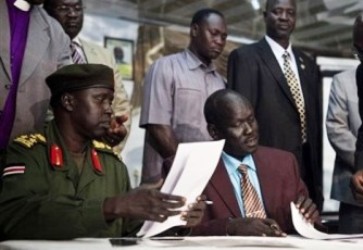Juba signs deal with rebel group of the late George Athor
February 27, 2012 (JUBA) – South Sudan on Monday said that it signed a peace agreement with the South Sudan Democratic Movement/Army, (SSDM/A), one of the rebel groups formerly under the leadership George Athor Deng Dut, before his death in December last year.
Barnaba Marial Benjamin, South Sudan’s minister of information and broadcasting on Monday announced the signing of the deal with the rebel group, describing it as an important step to resolving conflict in the seven month old country.

The 27 February agreement “was signed by Thomas Duoth on behalf of the government of South Sudan and Peter Kuol Chol Awan on their behalf”, Marial announced on Monday.
Peter Kuol Chol Awan was elected to replace Athor in January 2012, renewing Athor’s pledge to overthrow the South Sudanese government due to corruption, tribalism and undemocratic practices. Upon assuming the leadership Awan reportedly denied he had entered negotiations with Juba.
It remains to be seen whether Awan, after less than two months as leader, will be able to convince all of his armed men to integrate peacefully into the South Sudanese military or disarm. Recent deals between South Sudanese rebels and the government have entered difficulties.
In July 2011 rebel leader Gatluk Gai was killed just a week after he signed a peace deal with the Juba government. A member of Gai’s group has claimed responsibility for shooting the rebel leader as his forces reintegrated into the Sudan People’s Liberation Army (SPLA). The SPLA has denied allegations by some members of his group that they were responsible.
Then, in August last year, rebel leader Peter Gatdet, signed a peace deal with the government but failed to bring with him the majority of his South Sudan Liberation Army (SSLA). The SSLA’s rebellion in Unity State and parts of Upper Nile state has continued under new leadership.
POLITICAL REPRESENTATION
Marial announced the signing of the deal with the SSDM/A on South Sudan Television (SSTV) and said the agreement gives the rebels an opportunity to be represented in the national government as well as at state level, presumable in Jonglei and Upper Nile where the SSDM/A rebellion was based.
“There will be assembly points in agreed areas where processes of integration of their forces into the Sudan People’s Liberation Army would be conducted”. Some political detainees will also be released, Marial announced.
Abiel Riing Majak, a member of the rebel group confirmed the signing of the agreement to Sudan Tribune and said the SSDM/A was ready to implement the peace deal. But he pointed out that it was “one thing to agree and it is another to implement the agreement”.
Majak said the SSDM/A’s demands include; compensation for people affected by the conflict; the release of political detainees; return of the properties confiscated from some of the group’s leaders; as well as initiating peace and reconciliation projects.
The deal comes as Jonglei state prepares for a mass disarmament campaign, following clashes between rival cattle herding groups in December and January. Juba has blamed groups like the SSDM/A for bringing more small arms into the region already flush with weapons as a hangover from the north-south civil war.
Juba has accused the SSDM/A of being backed by Khartoum in an attempt to destabilise South Sudan, which seceded from Sudan in July 2011 as part of a 2005 peace deal. Khartoum denies aiding any rebels in South Sudan.
George Athor, the SSDM/A‘s former leader was mysteriously killed on 18 December 2011 by an SPLA unit in Morobo county, Central Equatoria, where he is alleged to have embarked on a recruitment drive.
However, the SSDM/A claimed that their leader was killed by the Ugandan government in Kampala and the SPLA’s story was a coverup. Both the South Sudanese government and Kampala deny Uganda was involved.
(ST)
